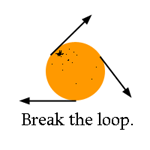

 | Tangentium |
January '04: Menu
All material on this site remains © the original authors: please see our submission guidelines for more information. If no author is shown material is © Drew Whitworth. For any reproduction beyond fair dealing, permission must be sought: e-mail drew@comp.leeds.ac.uk. ISSN number: 1746-4757 |
Snippets: Social Exclusion and Language"...knowledge and power are simply two sides of the same question: who decides what knowledge is, and who knows what needs to be decided? In the computer age, the question of knowledge is now more than ever a question of government." from Jean-François Lyotard, The Postmodern Condition: A Report on Knowledge (1984, University of Minnesota Press, pp. 8-9). "We fail to get away from the idea that using a sentence involves imagining something for every word. We do not realise that we calculate, operate, with words, and in the course of time turn them sometimes into one picture, sometimes into another." from Ludwig Wittgenstein, Philosophical Investigations (1953, Basil Blackwell, p. 131). "We are unlikely to harm a friendly neighbour because she has strong views about equal rights for women, but if we call her a 'femi-Nazi' she becomes 'the Other' - evil, dangerous, hated. We are unlikely to harm the couple down the block who are active on behalf of protecting endangered species, but if we call them 'environmentalist whackos' they become 'the Other' - weirdos who must be vilified and suppressed as enemies to 'normal' Americans. When our shared humanity with those with whom we disagree is stripped away, it becomes acceptable to blow them up." Howard Halpern, New York Times, 2/5/95. "Orthodoxy, of whatever color, seems to demand a lifeless, imitative style. The political dialects to be found in pamphlets, leading articles, manifestoes, White papers and the speeches of undersecretaries do, of course, vary from party to party, but they are all alike in that one almost never finds in them a fresh, vivid, homemade turn of speech. When one watches some tired hack on the platform mechanically repeating the familiar phrases -- bestial, atrocities, iron heel, bloodstained tyranny, free peoples of the world, stand shoulder to shoulder -- one often has a curious feeling that one is not watching a live human being but some kind of dummy: a feeling which suddenly becomes stronger at moments when the light catches the speaker's spectacles and turns them into blank discs which seem to have no eyes behind them. And this is not altogether fanciful. A speaker who uses that kind of phraseology has gone some distance toward turning himself into a machine. The appropriate noises are coming out of his larynx, but his brain is not involved as it would be if he were choosing his words for himself. If the speech he is making is one that he is accustomed to make over and over again, he may be almost unconscious of what he is saying, as one is when one utters the responses in church. And this reduced state of consciousness, if not indispensable, is at any rate favorable to political conformity." from George Orwell, "Politics and the English Language", in the collection Shooting an Elephant (1950, Secker and Warburg). "Patterns of discourse are regulated through the forms of corporate assembly in which they are produced. Alehouse, coffee-house, church, law courts, library... each form of assembly is a different site of intercourse requiring different manners and morals.... Each site of assembly constitutes a nucleus of material and cultural conditions which regulate what may and may not be said, who may speak, how people may communicate and what importance must be given to what is said. An utterance is legitimated or disregarded according to its place of production and so, in large part, the history of political struggle has been the history of the attempts made to control significant sites of assembly and spaces of discourse." from P. Stallybrass and A. White, The Politics and Poetics of Transgression (1986, Cornell University Press, p.80). "Taken to its extreme, it is possible to imagine a democracy that is perfectly adequate in all formal and procedural respects but in which no one participated. Everyone knew what was happening and why but no one was taking part in it.... more knowledge about what is happening does not make for a satisfactory democracy." from Paul B. Clarke, Deep Citizenship (1996, Pluto Press, p. 113). "...various community, associational, federal and regional movements do hold part of the answer to a more democratic politics - but only if such defences do not become parochial, exclusive or possessive." from B. Frankel, "Confronting Neoliberal Regimes", New Left Review 226, p. 71. "Each assertion of community refers iteslf to something that already exists and has a claim on us: our common fate as gay men, as women of colour, as people with AIDS, as members of an ethnic group, as residents in a village or suburb, as people with a disability. Yet our allegiance to each of these particular communities is something that we have to be made aware of, requiring the work of educators, campaigns activists, manipulators of symbols, narratives and identifications." from N. Rose, "The death of the social?", Economy and Society 25/3, p. 334. | |